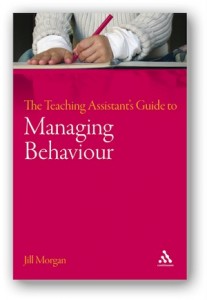 As a Teaching Assistant, behaviour management is more than likely a key part of your job description and is something we deal with in all aspects of our lives. How often do we change the way we communicate with people, based on their temperament?
As a Teaching Assistant, behaviour management is more than likely a key part of your job description and is something we deal with in all aspects of our lives. How often do we change the way we communicate with people, based on their temperament?
Part of your work as a Teaching Assistant will involve positive interactions with pupils to encourage the best outcome in any situation. The Teaching Assistant’s Guide to Managing Behaviour, written by Jill Morgan (available on Amazon.co.uk), is a helpful and engaging handbook for developing strategies and encouraging pupils to understand why their behaviour may be unacceptable and enabling them to take responsibility for their actions.
Competition
** THIS COMPETITION HAS NOW CLOSED **
We have generously been provided with two copies of The Teaching Assistant’s Guide to Managing Behaviour by Bloomsbury Publishing for two winners. All you have to do is ‘leave a reply’ below with an example of a behavioural problem you have faced and how you dealt with it. You don’t have to give your real name, but your answers will help other Teaching Assistants in similar situations.
Competition Terms & Conditions
- The closing date for all entrants is 30th June 2014.
- We will notify two winners after the closing date, who will receive one copy of the book each.
- Our competition is open to UK residents only.
- The prize is offered as stated and is non-exchangeable or transferable. No cash alternatives will be provided.
- Once notified by us, the winners will need to provide a UK address to send the prize.
- Your email address is required for the competition and will not be shared with any third parties.
- The winners will be notified by email.
- We reserve the right to pick an alternative winner if the original winner does not contact us within 14 working days of being told they have won.
- The prize is only open to entrants aged 18 or over.
- We reserve the right to cancel or suspend the prize at any point, without liability to the prize-giver or winner.
- Our decision is final on all matters and we will not enter into any further correspondence.
- By entering, you agree to be bound by these rules in relation to this competition.
About Bloomsbury
Bloomsbury’s academic division publishes around 1,100 books a year, with a significant presence in the humanities, social sciences and visual arts. For more information about their full range of digital services, textbooks, course books, journals, research monographs, reference works, and professional books in your subject area, please visit the official Bloomsbury website.
Read more about The Teaching Assistant’s Guide to Managing Behaviour by Jill Morgan